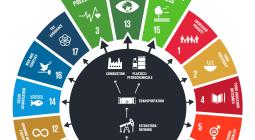We older people must fight for a better America, and world, for younger generations
Ihad the chance this month to spend a couple of weeks on an utterly wild and remote Alaskan shore – there was plenty of company, but all of it had fur, feathers or fins. And there was no way to hear from the outside world, which now may be the true mark of wilderness. So, bliss. But also, on returning, shock. If you’re not immersed in it daily, the tide of mass shootings, record heatwaves and corroded politicians spouting ugly conspiracies seems even more truly and impossibly crazy.
Camping deep in the wild is not for everyone, but there’s another way to back up and look at our chaos with some perspective – and that’s to separate yourself in time instead of space.
Until this past year it had never occurred to me to write anything like a memoir, because memoirs were for the exceptional: people who had overcome some great handicap, dealt with some revealing trauma, experienced something so remarkable that the rest of us could learn from the story.
By contrast, I’d had as statistically normal an American childhood as was humanly possible. I grew up in the 1960s and 1970s in Lexington, Massachusetts, emblem of America, at a moment when the suburbs were cresting; I went to fine public schools, and to the kind of mainline Protestant church that then dominated civic life; my father worked at a completely middle-class job, and my mother stayed home with her two sons; my Scout troop raised the flag on the Battle Green to mark the bicentennial. Our house, literally, was on Middle Street. That seemed utterly normal at the time, even boring. But perhaps boring is the new exotic, and that harkening back to those days can provide some interesting lessons.
It’s true that America was full of turmoil and clatter in those days, too: the turbulence of the 60s, the tragedy of Vietnam, the two-bit corruption of Watergate. Even so, the world seemed to have momentum, and it was carrying us in the right direction. Voting rights were expanding, thanks to the remarkable activists of the civil rights movement; in the wake of the first Earth Day, which brought 20 million Americans into the streets, we passed landmark legislation to clean our air and water. Women were winning new freedoms, including control over their bodies. If you watched TV at night, you got Walter Cronkite, which is to say we were working with a shared reality.
I think it’s pretty clear that the seeds of our current disarray were also sown in those days and often in those suburban places. For one thing, as property values began to take off, those who had made it on the boat were propelled ever higher, and those who had not (often people of color) got left very far behind. Those suburbs helped breed a kind of hyperindividualism, as the Depression and second world war, with their common purpose, receded into the distance. The year I graduated from high school, 1978, was the year of the country’s first tax revolt (California’s Prop 13) and also the year when inequality reached its low point in this country; every decade since the wealth gap has widened. Lexington – which had voted for George McGovern in 1972 – cast its ballots for Ronald Reagan by 1980. We began to believe that government was the problem, that taxation was an imposition, that greed was good. And perhaps lulled by the progress of our early years, we let problems of race, poverty and the environment fester; in the new mythology, markets would somehow take care of them.
Forty years later, many of those who remember those times are finally waking up to how much our civic life has decayed. I’ve spent the last year helping to start a coalition of people over 60 to work for progressive change – Third Act, it’s called – and, based on hundreds of conversations, I’d say “gobsmacked” is the operative word for how people feel. We had taken for granted the physical stability of our planet – and now its poles are melting. We had taken for granted the stability of our democracy and now people invade Congress to stop the counting of votes. We had taken for granted the slow but sure scientific progress of our society and now a third of the country does not want to take vaccines. (For those of us who can remember our polio jabs, that’s truly shocking.)
Since we’re complicit in this decay (there’s a reason young people started saying “OK Boomer”) we need to play a serious role in fixing it up. It’s been inspiring to watch older people protesting outside fossil-fueled banks or writing tens of thousands of postcards to high school seniors helping them register to vote or figuring out how to make sure Black voters have access to mail-in voting.
But along with that kind of work we have another gift to offer: sufficient perspective to say, loudly and clearly, that what we are living through now is nuts. There’s another kind of society, within living memory, that more or less worked. It had institutions and norms that allowed some kind of common conversation to take place. And saying so is not nostalgia – it’s a highly useful act of witness.
-
Bill McKibben is Schumann Distinguished Scholar in environmental studies at Middlebury College and the author most recently of The Flag, the Cross, and the Station Wagon: A Graying American Looks Back at His Suburban Boyhood and Wonders What the Hell Happened




